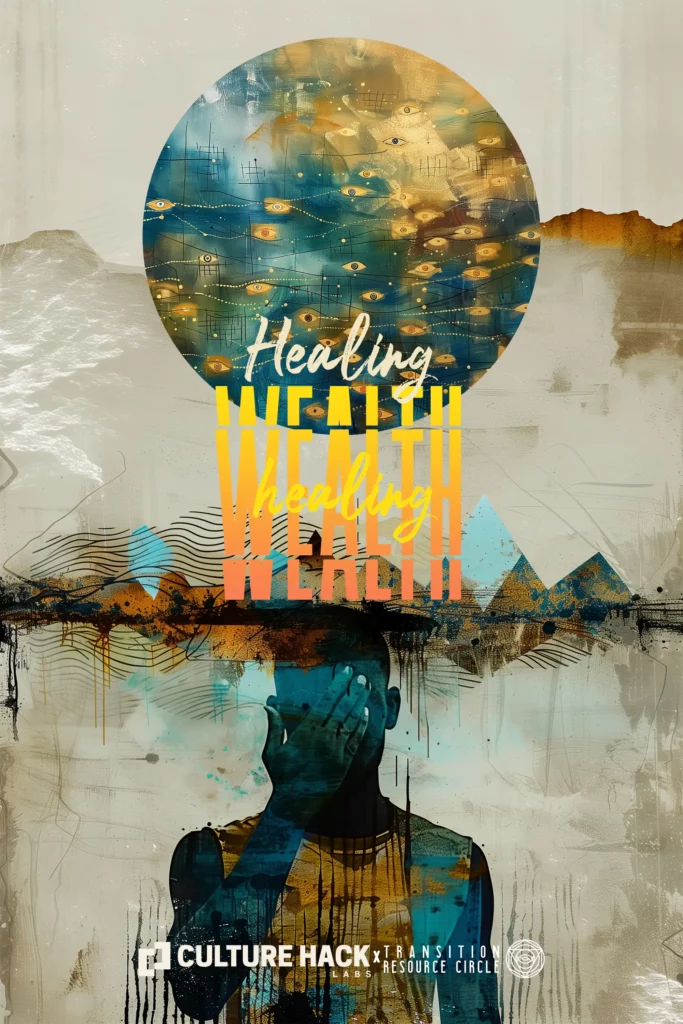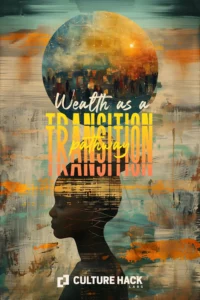The Word: A poetic exploration around healing wealth
This playful, poetic essay questions the fundamental essence of wealth, challenging the prevailing capitalist narrative. Drawing parallels between linguistic expression and societal constructs, it proposes a transformative approach rooted in communal reimagining and ontological resurgence, offering a poetic lens to envision a future where wealth is measured in relationality and harmony with the living world.

Let’s begin this exploration with a somewhat overly simplified hypothetical and ask the following question:
What is left when love has been replaced with sex; sex mediated through social media hyperbole and commerce of the self in the marketplace of influence; and when God, in all senses and meanings of the word, from deep spirituality to the unknowable/unsayable, to actual and literal and all present and one; has been replaced by money?
Then the only problem we are left with is, what to replace money with?
Money also known as, or unknown to many, as capital. The prime directive of the global capitalist operating system is the expansion of capital, above all else.
Capital is created through debt/growth and requires the perpetual growth of global GDP (gross domestic product). Capital requires the perpetual exploitation of human labor and natural “resources”. Capitalism is based on the false notion that we can continually extract linear materials from a finite world in order to avoid collapsing on its weight. To most everyone reading this article, this is not world-shattering information.
So perhaps we need to rethink the question of what to replace money with and ask the following question:
What ontological essentials has money attempted to replace that we must recover?
How are we to restore balance, and re-affirm our place embedded within the natural entanglement of things? How do we re-enter into the organic complexity without the hubris of believing we were ‘above’ it all? How do we redefine our task away from “fixing” what we perceive as the complicated into nice orderly coherence replete with regimentation, alienation, subjugation of the non-compliant, or the de-facto Other?
Perhaps it is not our job, as Western, educated do-gooders to construct a binary problem/solution, part/whole, self/other, inside/outside, etc. narrative or “new” story based upon those fundamentally broken and inadequate epistemologies to prop up the existing collapsing one. Though that is the reflex of many, and it is understandable, as capitalist modernity has colonized our mind/heart/body/psyche complex, to borrow language from Post Capitalist Philanthropy.
Where to begin?
One obvious place, which has become obscured, is with the reminder that money itself, misunderstood as wealth, is a social construct. One that has been so reified that many think it is an actual immovable constant of reality. I am speaking here of money itself and not the multitude of forms of wealth beyond capital.
Money is an abstracted placeholder for the potential to purchase goods and services. Whereas real wealth is found in the form of things like clean air, fertile soil, good health, strong communities, and deep personal relations (between humans and the more-than-human realms).
Maybe a good place to begin to start thinking about healing wealth is to change the story which shapes behaviors and beliefs about money.
Relatedly, we need to change the language which the stories are constructed from. As a poet, I have always been focused on how our linguistics shape and are the essence of our epistemologies; and how we have come to believe that those epistemologies are baseline reality in many ways rather than the mapping over something deeper, namely the ontology of being. In other words, our epistemology (how we understand knowledge) is a broken technology mapped over an ontology (how we see the world) which has been forgotten.
The epistemology of the dominant culture is one of separation. The epistemology begins with the abstraction of ‘I’ or ‘self’ from ‘not-I’ and ‘other; self versus an exteriority which includes other humans, other beings and all of Life.
This is the epistemology of the binary, reductive, cause/effect reasoning that most Western societies are built upon. And of course, money is the ultimate abstraction, separating real wealth, i.e. land, crops, animals, minerals, resources, happiness, relations, well-being, and the living world itself; into currencies with no real value beyond the ability to consume.
This separation takes us outside our natural entanglement with Life and gives way to accumulation as a strategy against scarcity which is intrinsic to the money system itself. With money, we have the possibility of possession and ownership of natural resources and all things. Including people. Money fuels and funds the project to justify dehumanization and commodification of the ecology, enshrines bankrupt notions of superiority for material gain. The simultaneous onslaughts of colonialism, imperialism, patriarchy, forced religious conversion and the imposition of debt-based capital was part-and-parcel of the stamping out animate ways of seeing and knowing, the erosion of the commons, and introduction of a binary, reductionist, materialist “monoculture of the mind” to use Vandana Shiva’s term.
And, of course, with ownership there arises the creation of man-made laws and coercive enforcement through a monopoly of state power and violence.
Maybe one path towards healing wealth is to heal the epistemology of separation and start from first principles and the ontology of the animate whole, of nested individuals and communities within a broader living world and cosmos. Embedded within something bigger than ourselves we might begin re-telling our story, carefully re-wording our gaze. This may begin to emerge as embodied practices from the individual, to the community those individuals co-create, to the collective, to the living landscapes, ecologies and entelechies that hold us.
So what does that look like?
First, let’s begin with language. By this I mean both how we take in the world with our senses and how we, in turn, breathe out and share/communicate/commune with/through those experiences.
This is a discursive process. ‘I see it like this’, and then ‘you, respond to that sharing’. You see, separation is built into our language, and by extension, our feeble attempts at forming a collective understanding of baseline reality.
What happens if we shift the ground of the ‘expression’ of the languages we have towards a gesturing towards the ontology they are mapped over or hiding within? By expression, I mean the grammar, syntax, frames, logic and foundational bases of a language.
Following is an example from one of my first books. Some of the phrasing is recognizable, but it is created in semantic and syntaxical ways which break or expose the rules of grammar; while sonically creating spaces for the reader to participate in the creation of meaning. There is no authorial authority and no hegemony of meaning; a non-colonized space, and is by design, participatory. This does not imply that the poem does not mean anything. There is an intent, but it is not rigidly fixed, entangled with the reader.
Here is the poem, Becoming Maze, from De-Flections, (1994).
Becoming Maze
She turns to touch the falling leaf.
A book gentle upon the fingers —
light with snow.
This unexpected twist
a broken stick, bent.
A weight of water too —
encrusted by seasons.
There is a curve, a sway,
a spreading of ring to yarn.
Here, you sleep with the ancients
cool, green, secluded in yellows,
brown and mauve. This color.
Your eye resembles the frame —
a home held by sticks & skins.
A wild plane upon frontiers.
Broken wings — lost horses.
Tonight you gallop on smoke.
The ice a sign.
Shake the hair from your face.
Read the water.
Follow the trout.
******************************
Something similar for culture and our systems of wealth is necessary if we are to fashion an escape from the predicament we find ourselves in, what many are calling the meta-crisis. We need to shift our worldviews from the abstraction and separation which money facilitates to one where wealth becomes visible and grounded through the recognition of where real value lies, within the entanglement of all Being.
This poem illustrates a direction towards healing wealth and the story of money. If we use Bill Sharpe’s Three Horizon model, which many readers will be familiar with; then this poem is not Horizon One; the type of poetry that is currently recognized as familiar poetry. Often, a Horizon One poem, even if it has a liberatory message, is in fact reifying the condition it seeks to escape.
The poem above is written in a Horizon Two experimental manner where the language and syntax is still somewhat familiar, but it is constructed in an entirely new way which challenges the foundational rules of language. However, its ‘meaning’ is found in Horizon Three, that which is not fully graspable, with its ontology allowing for new epistemologies to unfold.
Many of us around the world are doing the difficult inner/outer work of resistance to the dominant operating system of financial capital mediated through money by opening ourselves to deeper connection, relationality, animism, interbeing and non-separation to be able to see (again) what is truly valuable. This is part of living into a new ontology.
By creating and/or cultivating communities operating with ontological bases outside late-stage capitalism and its imperatives, we are creating other ways of knowing, being and relating to the world; other epistemologies and worldviews are emerging.
Perhaps, that is what we are replacing money with.
